#i love hector and andromache
Text
Grabs you by the arms
Did you know? Did you know Hector, with his handsome face and brow clutched his son? Did you know that he removed his great helm to press kisses to the boys crown? Did you know Hector told his lovely Andromache, go to your handmaidens and do your weaving, leave all men to their fate at the call of the war, me especially? Did you know she mourned him as he walked the great streets of troy for his fate was sung long ago, to die for the city he so loved? Did you know he gazed into the eyes of his foe, godlike Achilles, and asked only for his body to be returned to his high father Priam to be buried? Did you know he faced the best of the Greeks bravely even when he swore his skin would serve as feed for his dogs? Did you?? Did yo-
#hector of troy#andromache of troy#the iliad#greek myth#achilles#scamandrius#astyanax#tagamemnon#I’m doing a Greek lit class for my classics minor rn#as you can see#it’s driving me a bit insane#god I fucking love Hector
401 notes
·
View notes
Text
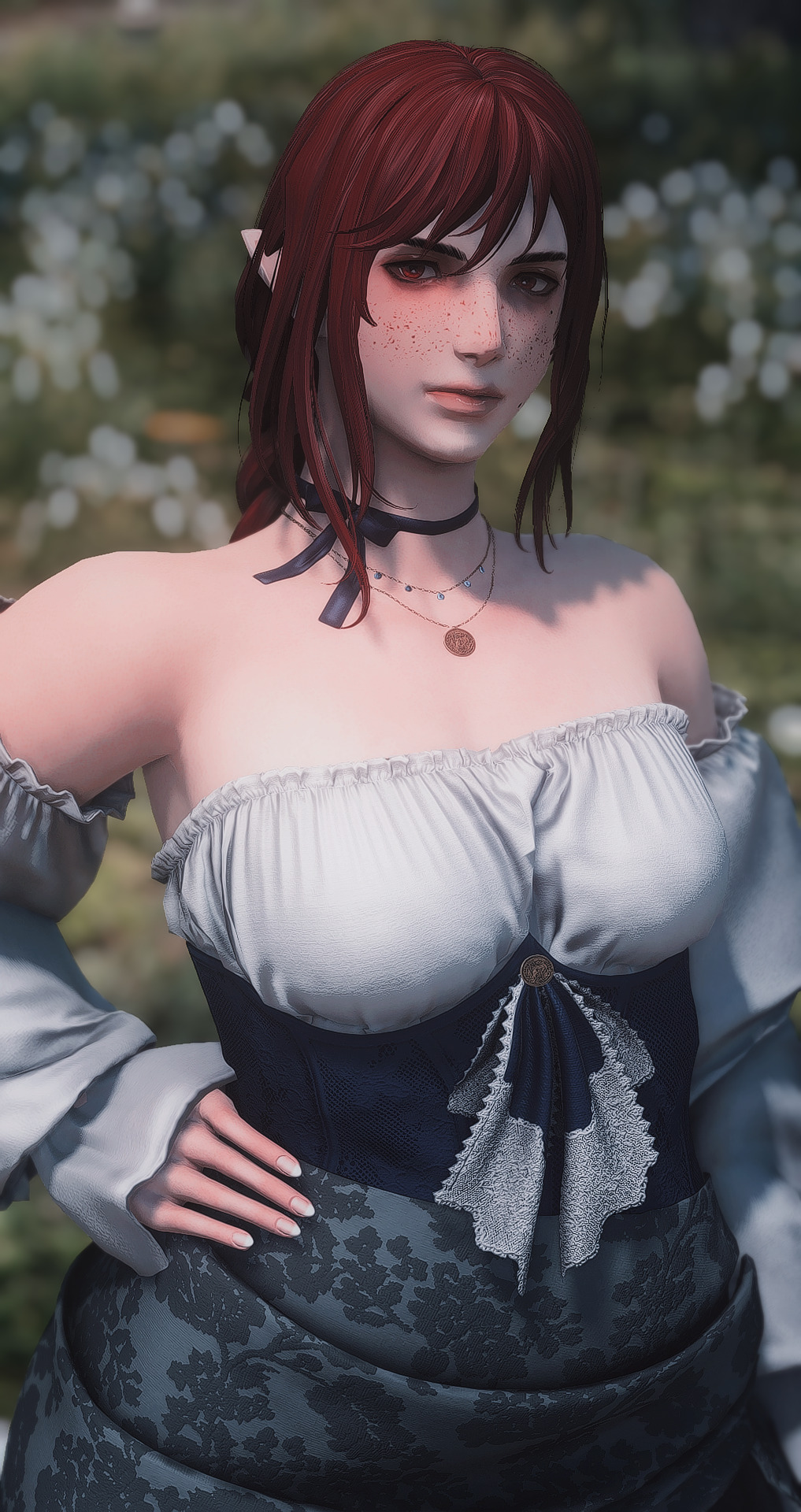


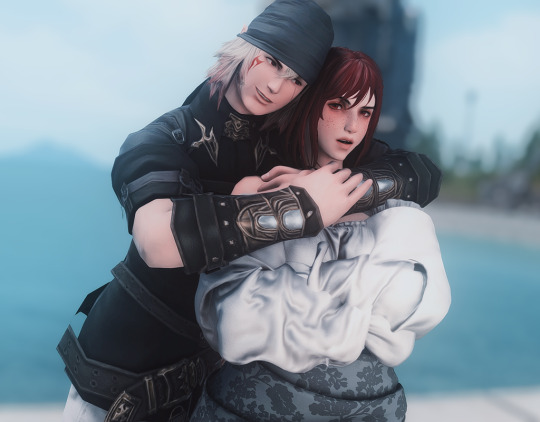
stayed up all night making tauvane's post-endwalker 'I've been absolved for crimes against the holy see of ishgard and I'm trying to reconnect with my son' fit. I think I did good
bonus: mother and son attempting to bond in the last pic :)
#mypost.#ffxiv gpose#ffxiv screenshots#ffxiv oc#🎐#🌧️#🌪️#i ruined my sleep schedule for this#but yea so it's official. she's half-elezen now like her baby son who is the light of her life (not clickbait)#i imagine she's roughly the same age as andromache and hector. so mid-to-late 40s at most#i'm still in the process of redoing her lore but this is basically what she looks like after her story is finished#there's still the middle part i gotta make outfits for lol#i finally got used to body scaling and she looks amazing :>#god i just. i just love her all over again#it's crazy what elf ears does to someone#q.
43 notes
·
View notes
Text

this might legitimately be the funniest i've been, ever
#the iliad#hector of troy#andromache#astyanax#scamandrius#i love the fact that all of troy really said hector sucks at naming children#anyways
22 notes
·
View notes
Text





"....bright-eyed and fair, with a tall and beautiful body. She was modest, wise, chaste, and charming."
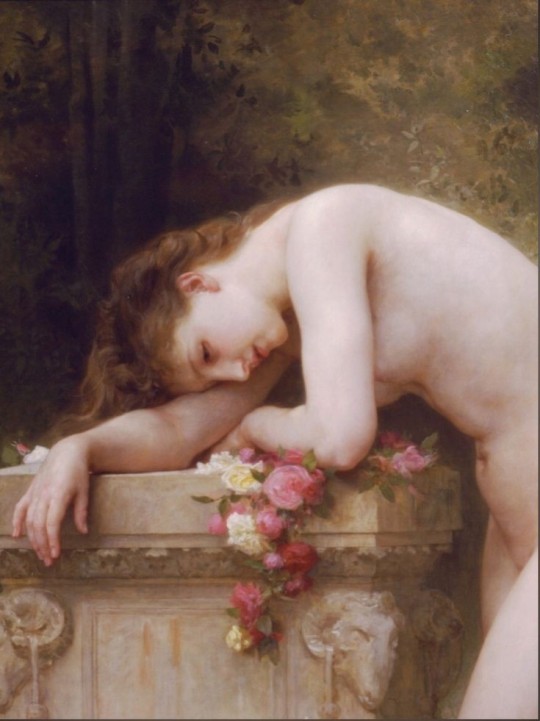



Andromache - Princess of Troy and Queen of Epirus
A princess of Cilician Thebe, the daughter of King Eetion, Andromache was the beloved wife of Hector, the famous Trojan prince and warrior, and thus crown princess and future Queen of Troy.
Her father and her seven brothers were killed by Achilles in the sack of Thebe. Her mother was taken as slave, ransomed, but died of illness. Andromache was courted by Prince Hector who, according to the Iliad, brought "numberless gifts to win her".
In the Iliad, Andromache and Hector have a deeply loving and tender marriage. The end of Book VI, the famous scene between Hector and Andromache and their infant son, Astyanax, is considered by most commentators to be the most moving in the Iliad.
Their happiness is doomed to end in tragedy, as Hector confesses that it is not the thought of Troy falling that troubles him, not even the thought of his father, mother and his people dying at the hands of the Greeks; but that of his beloved wife being taken as slave.
Hector's dire predictions were all to come true. He is eventually killed by Achilles, Troy falls, and his infant son with Andromache is slain.
After Troy was sacked, Andromache was taken as a slave and concubine by Neoptolemus, the son of Achilles. Neoptolemus had killed Priam, the king of Troy with the same violent temper his father was famous for.
Andromache bore Neoptolemus three sons – Molossus, Pielus and Pergamus. She was hated by his barren Greek wife, Hermione, who, seeing that Neoptolemus loved Andromache, thought that her husband's concubine was plotting to replace her. Hermione and her father Menelaus planned to kill Andromache and her son Molossus. This attempt was thwarted by Peleus' arrival and Neoptolemus' ultimate murder.
Once Neoptolemus had died Andromache married Helenus, who was a fellow Trojan captive, Hector's younger brother. A free woman once again and married to Helenus, she became Queen of Epirus, and bore a fifth son, Cestrinus. With her new husband, she founded a new city called "the new Troy". Andromache faithfully continued to make offerings at Hector’s cenotaph for the rest of her life.
After Helenus' death, Andromache left Epirus and spent the rest of her days in Pergamum – a new city founded by one of her sons, Pergamus. It was there that she died of old age.
#I love her so much 💙#I need a book based on her story so bad#andromache#hector x andromache#troy#the iliad#women of troy#hector#greek mythology#trojan war#hector of troy#mine*
16 notes
·
View notes
Text

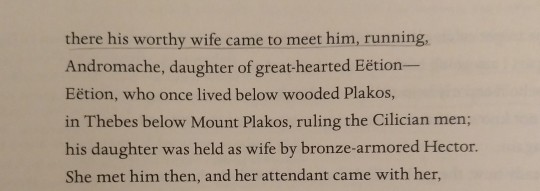
Hektor and Andromache run to each other. They both long to be together so deeply they can't help but run. Hektor learns where Andromache is and takes off at a run, and Andromache catches sight of him and runs to meet him I 🥺🥺😭♥️♥️💔
#its 12 am im rereading book 6 im a mess#the iliad#hektor#andromache#hector x andromache#THEYRE SO FUCKING IN LOVE I CRYYYYY
93 notes
·
View notes
Text
TAG GAME
Tagged by @islemeadow . Thank you so much! ❤
Last song: Sparta by Sabaton
Fav colour: Hard to say. When it comes to clothes, black of course. But, in general, black, dark reds, dark greens, golden, silver, white, grey, some shades of pink, purple and blue... I appreciate then all for different reasons, in various contexts.
Currently watching: At the moment? A video about Biblical monsters. For the record, yes, the random comment in Greek letters is mine. As for shows, I'm in the "wondering what to watch" situation right now.
Last movie: The Nun II, I think. I've re-watched it a lot lately.
Currently reading: The Iliad. And, St. Augustine's Confessions. Both for uni. I had also picked up Livy's Punic Wars, but set it aside for now.
Current obsession: The Antichrist, demons, and Biblical Mythology in general (especially everything to do with Eschatology). Yeah, that's... Not a soothing hobby in the current times. AHS: Apocalypse, which I recently, finally, watched for the previous reasons. And, Warrior Nun. Archangel Michael x The Antichrist ship dynamic. In my original work, and fanfictions. Michael is usually male, and the Antichrist is female, but I've developed a couple of ideas where it's the reverse.
Sweet/Savoury/Spicy: Savoury, and spicy.
Current game: I've never gotten into gaming. Does Gardenscapes count?..
Relationship status: Single
Last google: Something about 3rd declension latin nouns.
Currently working on: Fanfiction-wise? I have a few WIPs, too many for my own good. Sanguis Tenebrarum and Age of Angels are my only WIPs currently published (and I am picking at Ch3 of Sanguis). But, I've been also working on my Warrior Nun Biblical AU. And, my AHS ideas. One, is the Millory arranged marriage thing. The other, is Michael Langdon x OC. Her name is also Michael. You know, the Archangel. You guessed that by now, didn't you?.. They are supposed to marry in the end, if only for the punchline.
Tagging: @horror-blog-78 , @nocakesformissedith , @tisdae , @warriorgay07 , @onceuponaweirdo . No pressure, only if you want to!
#personal#tag game#baltic demon#yeah that ship if see a way to make it happen i will#the biblical au also has this ship but it's absolute clownery from both#so far every single character is despicable in the iliad except helen hector and andromache#well i odysseus also and i like hera thoughs she's the definition of scheming#i love the schemers#yeah even if i tune my feed it doesn't become more calming like i've said to some people#because my interest are like... book of revelations and politics#those topics can turn even a sane person into a paranoid mess even during... calmer times#i've felt really lonely in the WN fandom#funny note as i watch the video I acidentally heard McDonnald's instead of Idolatrines and was really confused for a second#i say I'm working on wips but instead I've been procastrinating by making gifs of Michael Langdon's face#my excuse is I'm studying his mannerisms
7 notes
·
View notes
Text
andromache,,,,,
#i did a paper on her and hector and now my wife and i are like#woagh#im physically ill abt her... andromache girl i love you#andromache of troy#alex my beloved
2 notes
·
View notes
Text
enough Lyanna Stark/Helen of Troy comparisons we’re moving onto Ned Stark/ Hector prince of troy comparisons
#yes ofc catelyn would be andromache#but becky pointed out that bran (and not robb the dead child) would be the best astanyax parallel#i was shocked cause YES#anyways love that ned cuts out having a weirdo brother who abducts someone and just goes straight to having a helen esque figure as a sister#that causes problems#also with hector being remembered as a great warrior but one of his most beloved scene is the one where hes being a family man with his wife#its ned all over
14 notes
·
View notes
Text
I think a favorite pastime of mine is looking up various artwork of Hector, Andromache and Astyanax and losing it at the different absurd ways Astyanax in particular is painted/drawn lmao
Like what is this

#like sometimes I wonder if the artist even knew what a baby is#some of them are cute tho#anyway family goals and I love them#hector#andromache#astyanax#my boi#classics#the iliad#greek#art#padovanino#departure of hector#this astyanax is really something#he’s just sayin heyy#Andromache’s expression is also incredible
8 notes
·
View notes
Text
I just cried while writing a discussion post about the Illiad 🧍😎✌️ in my defense, the discussion post is literally titled "WHAT MAKES LIFE MEANINGFUL"
#maybe im dramatic but i was like ok so... the power of love and making my friends and myself happy.......... is the meaning of life#ma'am i have depression ive thought about this extensively#anyways heres a paragraph tangent about how adora and catra and achilles and Patroclus are narrative parallels#in s5 ep 3 save the cat-#midnighttalk#not joking i am crying tho#the illiad is rlly sad tho in my defense#like damn..... andromache and hector got me#like.... theres no winners in war...... aough ough ouch#i wrote aough in my quote asisngment btw#bc aough....#my fun trait about me is i thoroughly enjoy classics like Shakespeare and the illiad#first time reading the illiad#i sort of read the odyssey and maybe the aenied before tho#but also aough ouch ooo the human condition ouch oof#anyways shout out to Ricc who said in his post that love and friendship doesnt exist ✌️ fuck you i hate you im biting you x100#not solely for that he just has shit takes and zero respect
3 notes
·
View notes
Text
The thing is that everyone everyone EVERYONE posting about Hector of Troy understands the two poles of his conflict (the household and the battlefield) but so so sooo many posts file off the nuances of where he actually falls between them.
It's not entirely inaccurate to say Hector is a family-oriented character who fights because everyone he loves and everything he knows will be destroyed if he doesn't. But it IS a simplification.
When Andromache confronts him on the way to the gates, she doesn't ask him not to go out to fight; they both acknowledge the absolute necessity of doing so. But she asks him to fight defensively, to stick close to the walls and to focus on not allowing the invading army to breach vulnerable areas therein.
And he denies her request.
He has to fight aggressively and with the intent to win glory, he tells her, because he cannot bear to show his face in Troy if he does anything else. Even knowing that at this point his death would almost certainly cost Troy the war, destroying everything he holds dear including Andromache herself, he can't bring himself to preserve his life if it means falling short of the standards of Bronze Age masculine virtue.
This would have been totally consistent with the way the internet reads him IF she had asked him to stay home and hide under the bed or something. There's a reason he's as much if not more a foil to Paris as to Achilles. But that's not what Andromache asked him to do.
Given the choice between fighting ONLY to defend Troy or fighting to achieve honour and victory in the defense of Troy, he chose the latter.
The tragedy of Hector isn't solely that he's a father and husband who is forced to be a warrior. It's that he's juuust enough of a family man to want to be one, but... not enough to risk being branded a coward for it.
At least, not until it was too late.
He wanted his wife to have a husband and his child to have a living father, he really did. He outran fleet-footed Achilles three times around the walls of Troy in what I can only imagine must have been as much a feat of desperation as of athleticism. To keep ahead of someone on foot, over that distance, wearing armor, sounds frankly painful- I say this as someone who used to love running.
If the gods hadn't decieved him into thinking he had help against Achilles, would he have run until he collapsed? Until some archer on the walls managed to either take down Achilles or at least force enough distance between them that Hector could escape? Would anyone have shamed him for it? Having faced the shame of cowardice and survived, would he have fought differently in the next battle, more defensively?
He died before we could find out.
#dont be afraid correct me if im wrong i will genuinely appreciate it#i have only lay knowledge & am acutely aware academic knowledge is a whole different animal#hector of troy#the iliad#andromache#trojan war
336 notes
·
View notes
Text
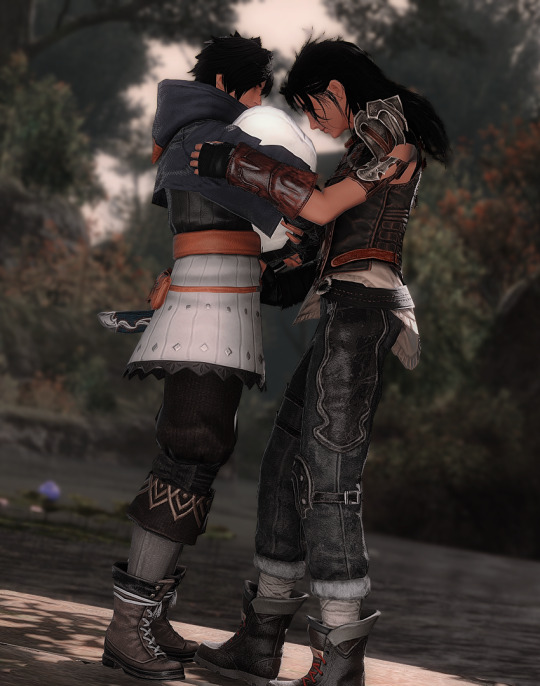
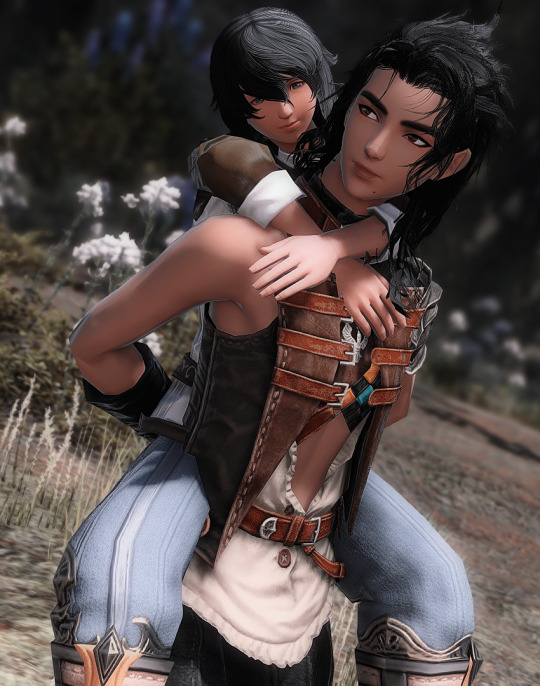

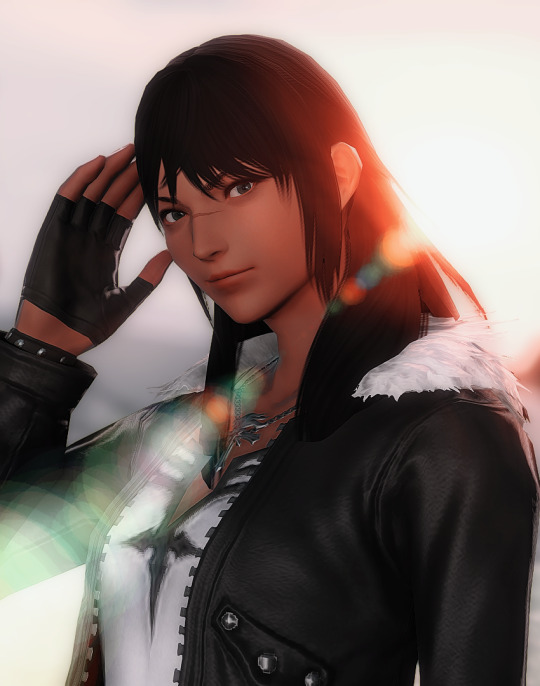
happy nameday, paris (6/1)
#mypost.#ffxiv gpose#ffxiv screenshots#ffxiv oc#🍃#ueueuuue (sound of crying)#from l to r: newborn with hector and andromache / childhood feat. andi before unfortunate events / teen years in ul'dah / current age (24)#i honestly love the outfit i came up with for their teen years#yes that's estinien's ponytail sorryyyyy#they keep stealing his looks#if you see clipping no you don't#q.
6 notes
·
View notes
Text
Just bros being dudes
In book twenty four Achilles “longs for his manhood” and by that point he has brises back. platonic yeahhhhh sureeee.
“Now you lie here slaughtered, and my heart has no want of food or drink i only want of you” yeah, straight
Have his ashes mixed with his boyfri- I mean best friends ashes. Yep, just besties
Calling his “bestie” his most beloved on several occasions. Mhm, totally not gay
Literally going insane after pats death. Yuppers, no homo there
Crying so loud the gods at the bottom of the goddamn ocean could hear him. Totally hetero
“Why true heart do you come hither to lay these charges upon me. I will of my own self do what you have bidden me.” Yes yes, only the straightest of friends call each other true heart
"Draw closer to me, let us once more throw our arms around one another and find comfort in the sharing of our sorrows."
using the same language to mourn patroclus as andromache used for hector. really good mates
Heterosexuals you say? Surreeeeeeeee
edit: I love how no one has openly objected to this post
#tsoa#iliad#achilles and patroclus#achilles x patroclus#patrochilles#no homo here#incorrect tsoa quotes#But this couldn’t be gayer#It’s five am and I really need to sleep#The fact that is is from the Iliad and not a Shakespeare or Plato work#Y’all can’t convince me this isn’t gay#I sent this to my friend asking her what she thought and she thought it was from Ao3#no she has not read the Iliad
478 notes
·
View notes
Text
many thoughts about epic: the musical...
i am once again in the middle of essay writing but plautus is boring and my friend introduced me to this album so u already know I binged the entire thing
(quick warning for spoilers of homer's odyssey? if that's necessary?? man idk whatever)
first thoughts naturally concerned odysseus. i have hated this man with a burning passion ever since I started studying classics - i think he is irredeemably selfish, a liar masquerading as a 'resourceful hero,' and basically just a twat all around. that being said, i respect that epic is not an exact replica. in fact, i like that about it!
readings of odysseus as a loving husband and father, and a man who cares deeply for his crew and fellow warriors is one i would love to see reflected in the source text (though i admit i have only read two different translations so far, so this is subject to change depending on translators choice!), if only because it would be so so refreshing. and epic does that extremely well! i find epic's odysseus to be far more likeable, insofar as he is fueled not by greed for glory (kleos for the nerds out there) but rather the desire to return to his wife and son. (I personally would argue that, while homer's odysseus is indeed fueled by a desire for homecoming (nostos), it is not for the sake of penelope and telemachus, but rather concern over the security of his status and position within the household (oikos))
i also very much enjoy that the love he holds for his family is not an inherently positive trait. in the aeneid, and often in myth, it is achilles' son, neoptolemus/pyrrhus who kills the son of hector and andromache, astyanax by throwing him from the walls of troy - less common, it is odysseus (which i did not know until i googled it just now oops). homer's odysseus does not reject the gods. he is beloved by some, hated by others - he receives their boons and curses as they come. he revels in the attention of the divine, no matter positive or negative, for it is proof of his kleos. epic's odysseus is so much more... human. he doesn't vie for glory that reaches the skies. if anything, he rues it. in the horse and the infant he supplicates himself to (who i assume is) zeus - which is such a loaded act i am genuinely struggling to think of how to articulate it, but boy am I gonna try my darndest.
the act of supplication and guest-friendship (xenia) is a very key theme within the odyssey, and to a point in the iliad also - essentially, if a traveller were to arrive at your doorstep, you were obliged to let them in and provide food, drink, and lodgings to that traveller, no questions asked. in return (because reciprocity is VERY important in homer especially), the guest would provide entertainment, tales of their travels, etc, and would be respectful of their host. the patron of these travellers was zeus. any violation of these terms, on part of the guest or host, would be met with divine scorn. for odysseus to supplicate himself to zeus is therefore meta as hell, but I would instead bring attention to the echoing lyric "hes bringing you down to your knees." 'he,' assumedly, is astyanax. his father, hector, is dead; as is his grandfather, priam, and all of priam's other sons. at this point, one could assume that it is astyanax who is ruling troy, who is now the host of the city that odysseus, a traveller from another land, has entered and ransacked. zeus' 'prophecy' of astyanax growing old and seeking revenge (reciprocity! homeric greece had a 'revenge culture' - essentially 'an eye for an eye' as well as 'you scratch my back, I'll scratch yours,' though not always so clear-cut), therefore, would be odysseus' punishment for violating the terms of xenia.
supplication, however, is not limited to guest-friendship alone. for example, in odyssey 22, when odysseus slaughters the suitors occupying his home (is that spoilers?), their priest leodes supplicates himself at odysseus' feet, begging to be spared. odysseus takes his head from his neck in an instant. odysseus' kneeling before astyanax, therefore, is no simple act between a guest and his host - perhaps he is begging the infant for mercy, for forgiveness, or perhaps he is positioning himself for punishment; in killing astyanax, odysseus accepts his own death. perhaps this means his fate (which, in case of homeric epic, refers to the time and manner of one's death), or perhaps it is a part of him that has died. in just a man, odysseus asks "when does a man become a monster?" his killing astyanax prevents the boy from ever becoming a man, and spares him from a life fueled only by revenge and the need to regain his glorious birthright, and it turns him into a monster. just as he says he would, he trades in the world where he is 'just a man' for a world where he is a cruel beast, all for sake of his family.
(quick detour but i really like how odysseus' focus is primarily on penelope rather than telemachus. [insert deadbeat dad joke here], but in reality, he doesn't even know the boy. penelope he chose to marry and fall in love with - it's no question that he loves telemachus, but after ten years, it is only natural that he would miss his beautiful, tricky wife with more fervour than the child he never had the chance to love. it shows he is imperfect, even illogical - the son is the father's entire legacy. just as odysseus is 'son of laertes', so will telemachus be 'son of odysseus', the protector of his immortal heroic legacy. yet it is penelope whom odysseus yearns for.)
(another detour but "i'm just a man" is such a juicy lyric, because the entire message of homer's odyssey is that odysseus is not any man - he is a man that the muses deem worthy to inspire great poets to compose epic poems that persist through thousands of years and a million different voices - a hero. but epic's odysseus is not that hero. he is a man, trying to go home, craving comfort and the warmth of the hearth. these 'flaws' humanise him more than homer's odysseus could ever imagine.)
skipping over to polyphemus, odysseus violates xenia once again by killing polyphemus' sheep, albeit unwittingly. homer makes this violation very obvious - odysseus and crew eat polyphemus' cheese and wine while polyphemus tends to his sheep, knowing that the cave is obviously inhabited, and they even wait for polyphemus to return to ask for more. it is worth noting as well that, at this point, odysseus and crew are still jubilant about their victory, and unlike in epic, these 'detours' are purposeful, specifically so that odysseus can scope out the islands for anything of interest he can snatch and add to his spoils of war, adding to his kleos by means of physical wealth (timē) - which makes odysseus' offer of treasure to appease polyphemus all the more baffling in epic. this odysseus is a leader who prioritises the lives of his men over his own kleos, which makes the final lines - "you shall be the final man to die" // "what?" // "watch out!" - all the more heartbreaking. he wants to protect his men, so that they too may return to their families back on ithaca; the prospect of watching them die before his eyes after he already witnessed so many lose their lives in battle must be so utterly terrifying.
polyphemus is so excellently creepy as well! i loved him in the odyssey - this was where I really started to dislike odysseus, actually. he's a cyclops, obviously inhuman, yet he rears sheep and makes cheese and wine and weaves wicker baskets to keep them in, trying to play at humanity. i really did sympathise with him from the first time I read it. epic's polyphemus is similar, so very calm in his anger yet ruthless all the same, and demonstrates great restraint in comparison to his counterpart in the odyssey, who gets filthy drunk after mashing six men dead and allows odysseus+co. to fashion a stake with which to blind him. much of the violence against polyphemus, as well as the violation of xenia in homer's odyssey is 'excused' by the fact that polyphemus is a 'barbarian', to whom concepts of civilised people do not belong.
(very quick detour but polyphemus' first admonishment of odysseus - "you killed my sheep" up to "take from you like you took from me" - makes such heartbreaking parallels to astyanax's murder and the sack of troy. it almost provides a visualisation of the guilt that odysseus must still be battling. i would have loved to have been in his brain when he heard polyphemus say that.)
the mercy odysseus shows polyphemus is particularly interesting - homer's odysseus leaves him alive and tells him his name purely so that his name will spread and his kleos will grow. but epic's odysseus, despite his conviction to kill in survive and to avenge is fallen comrades in remember them, spares him. in part, this is to assure them an escape, so that the cyclops' giant body does not block their exit - but athena's interruption makes clear that this is not all. she criticises him, remarks "he is still a threat until he's dead." no doubt this calls back to zeus' warnings about astyanax, hence his refusal (or inability?) to commit to slaughter. for a homeric greek hero to allow a foe to live on after his allies had been slaughtered is a grave failure of reciprocity, casting shame on both the hero and their enemy. homer's odysseus escapes this with his reputation intact, since as a result polyphemus curses him to face poseidon's wrath - as I mentioned, for a hero, even negative attention from the gods is a good thing as it proves that their reputation/glory is known all over, even in olympus. but, as we have established, epic's odysseus cares not for kleos. the decision to tell polyphemus his name is entirely impulsive and irrational, grieving his comrades, hence athena's outrage.
the relationship between athena and odysseus is founded entirely on the principles they share, described in warrior of the mind (if anyone can lmk whereabouts this song fits in the timeline I will be so grateful, I'm stupid unfortunately :/). they value wisdom, reason, and rationality over brute strength and bloodlust. epic's athena becomes odysseus' patron goddess with the goal to "make a greater tomorrow" and "change the world" - aspirations that are entirely foreign to any homeric god. gods in homer do not care about the wellbeing of humans unless they are directly related to them, and they certainly don't care about the wellness of humanity as a whole. humans are toys and tools of the gods. the amount that athena cares for odysseus, even in the odyssey, is unusual, demonstrative of how much she cares for him, yet epic makes their comradery more obvious, even going as far as to (tentatively) call them friends. my goodbye frames athena's anger as disappointment at an experiment failed - calling back to warrior of the mind, where she claims to have "designed" him - but odysseus' replies to her makes clear that it is far more personal. perhaps, to her, odysseus acting so irrationally is even a betrayal; odysseus is abandoning the principles of reason they both once held and thus is forsaking all that they once shared and that she, as the goddess of wisdom, stands for.
ive always considered athena to be a very interesting goddess. she is a patron of both war, which in homer is only carried out by men, and weaving, the traditional work of women within the household - her very nature is a contradiction of masculine and feminine. although it is ares who is considered the 'black sheep' of the olympians for his brutality in war, epic's portrayal of athena through odysseus' lens paints her as lonely and ostracised - "since you claim you're so much wiser // why's your life spent all alone? // you're alone." It is clear that odysseus here does not view her as his patron at all, rather as a friend - and to that she takes offence, because she is a goddess, eternal and all-powerful. she does not need friendship or comradery; those are mortal concerns alone. personally, I see epic's athena as incredibly insecure. she cuts odysseus off because she cannot bare that a mortal has been able to read her so clearly, to see all the ugly parts of herself that she keeps hidden to retain the facade of the perfect goddess. she knows the paradox within herself - warrior and woman, immortal and alone - and rues that odysseus was able to see it as well. the cruellest part, the most ironic, is that his being able to figure out the true, imperfect nature of a god shows that he has not abandoned the path of the warrior of the mind. in fact, his wisdom extends beyond mortality into the realm of the divine. but athena is blinded by her anger and insecurity, and she says her goodbyes. she disappears from there, only to appear again to try to warn odysseus of his crew opening the bag of winds given to him by aeolus in keep your friends close, once again demonstrating her care for him, despite her anger.
the amount that odysseus cares for his crew is demonstrated time and again throughout the album, yet in the end, he still slowly loses their trust. aeolus' winds are the first sign. his crew betrays his orders upon the first whisper on the wind that he might be keeping treasure from them. the next sign, in puppeteer, is eurylochus' confession upon arrival to aeaea (circe's island), which odysseus brushes off, much as he brushed off eurylochus' concerns in luck runs out. then, in a matter of moments, 600 men are reduced to forty by the wrath of poseidon - which in itself is a significant change. while odysseus in epic is explicitly blamed for failing to kill polyphemus, homer's odysseus takes no responsibility for the deaths of hundreds of his men. it happens when they arrive at telepylos, which, unbeknownst to them, is home to the laestrygonians, a race of cannibalistic giants. odysseus, apparently sensing something off (who tf does he think he is, spiderman?), allows his entire fleet to enter the bay of telepylos while his ship alone remains outside - and when those ships are attacked and trapped, he alone takes his single ship and escapes, allowing twelve ships of men to be ripped apart and eaten by cannibals. an act which he shows no remorse for.
in my interpretation of homer's odyssey, it is this slowly slipping trust that eventually leads to his men ignoring his warnings and feasting on the cows of helios which leads to the deaths of all his remaining crew, including eurylochus and polites (spoilers? idk). so, once epic: the musical catches up to book 12 of the odyssey you WILL be seeing me again I hope ur excited.
there is definitely more i could say here, especially about the circe saga bcs ohhh my god I love circe and I love this circe especially (a female character with actual motive other than being a victim? homer could never) but unfortunately I'm running out of steam and I do in fact have 3 essays due this month (help) so I will probably return to this later !! hopefully its readable bcs I'm not going back to edit any of this ;)
#joined cort's spotify jam while writing this and got rickrolled#the message here is trust no one#skipped my seminar to do work and did this instead#fuck u plautus and your dumb menaechmi#this took like 4 hrs to write i have issues#epic the musical#epic the ocean saga#epic the circe saga#epic the cyclops saga#epic the troy saga#epic#classics#classical studies#homer's iliad#homer's odyssey#the odyssey#odysseus#penelope#media analysis#literary analysis#longpost#homer
81 notes
·
View notes
Text
Early encounters where Andromache thinks Hektor is strong and dignified and compelling are all well and good, but I really think it adds a lot if she thinks he's a dork. I much prefer Andromache having a fuller and more humble picture of Hektor than an incomplete, but more enticing view of him. Like maybe Hektor is trying to act composed and mature and regal, and Andromache can see that, be she can also see he's kinda awkward and he's foolish sometimes. Most important is that she enjoys this. If Hektor doesn't seriously fumble some interaction and get really embarrassed, only to relax a bit when Andromache grins warmly at him in response, what's even the point?
#andromache: haha oh hes a dork actually (affectionate)#hector x andromache#i like her having a level view of him at first#both in seeing his flaws and not being taken with him#maybe its just bc i dont feel the allure of implied romantic potential#i dont want any part of the rosy haze of love at first sight#its not inherently bad it can be done well. but i sure get tired of it#the iliad#hektor#andromache
25 notes
·
View notes
Text
"In a famous scene in Book 6 of 'The Iliad,' Andromache, accompanied by her baby son and enslaved nurse, begs her husband, the great Trojan warrior Hector, to adopt a less dangerous military strategy, rather than face the enemy on the open plain. He refuses, and they part for the last time. In the original Greek, the wife and husband each use the same word to address one another: 'daimonios.' The word is cognate with 'daimōn' — 'spirit' or 'deity' (from which we get the English 'demon') — and presumably suggests, in its most literal sense, that a person is influenced by some superhuman power. Yet it is surprisingly common in Homer, generally used when one individual addresses another. It is sometimes taken to suggest little more than 'Sir' or 'Ma’am'; sometimes the context suggests it is negative ('possessed' or 'crazy'), sometimes the opposite ('You marvelous person!').
Many translators of this scene use different renditions of the word in the two instances. In Lattimore, Andromache calls Hector 'Dearest,' while he calls her 'Poor Andromache!'; in Fagles, Andromache calls Hector 'Reckless one,' while Hector calls Andromache 'Dear one'; in Fitzgerald, Andromache uses 'Wild one,' and Hector uses 'Unquiet soul' (a lovely phrase lifted from Shakespeare’s 'Merchant of Venice' — although oral poetry does not abound in clever literary quotations). I felt it was important to use the same word for both the wife addressing the husband, and the husband addressing the wife, to echo the symmetry suggested in the original, and I used 'strange' in both instances ('strange man … strange woman,' echoing the different genders of the original). I hoped that this word might hint at the Greek term’s suggestion of something unusual, perhaps divine or inhuman. This heartbreaking scene evokes both deep intimacy and profound estrangement between husband and wife, one of whom will soon be dead and the other enslaved."
- Emily Wilson, from "Emily Wilson on 5 crucial decisions she made in her ‘Iliad’ translation." Washington Post, 20 September 2023.
#i'm so intrigued by this new iliad translation that just came out!#emily wilson#quote#quotations#homer#the iliad#hector of troy#andromache of troy#hector and andromache#ancient greek language#classics
176 notes
·
View notes